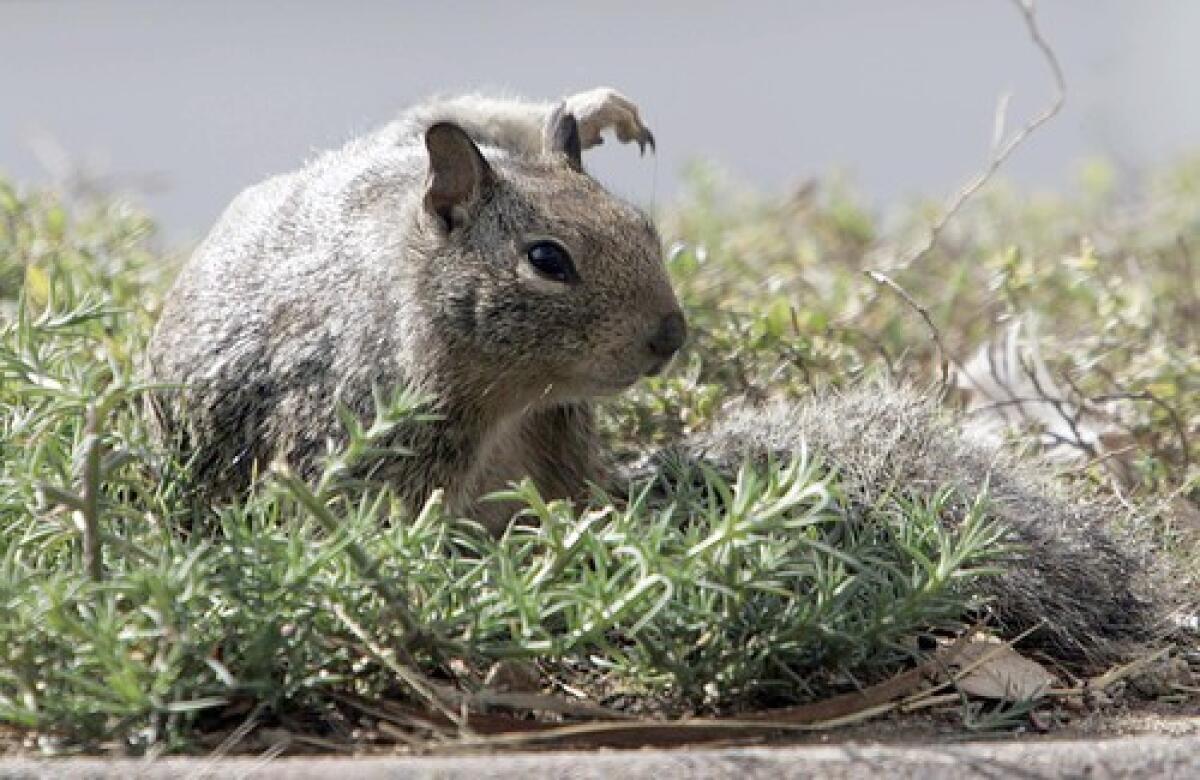For squirrels gone wild, city plans a turnoff

- Share via
Afraid that a population explosion among squirrels in a city park could pose a public health risk, Santa Monica officials are ready to try a proven method of dealing with the problem: birth control shots.
Plans call for squirrels in Palisades Park to be injected with an immuno-contraceptive vaccine to stunt sexual development. Breeding season runs from February to April, but the inoculations will take place this summer when the squirrels are most active outdoors and easier to trap.
FOR THE RECORD:
Squirrel population: A photo accompanying an article in Monday’s California section about the overpopulation of California ground squirrels in a Santa Monica park showed a picture of a different type of squirrel. The animal pictured was a fox squirrel. That photo has been removed.—
Santa Monica would be only the second city in the state, besides Berkeley, to try the immunization program.
“It’s a cutting-edge approach,” said Joe McGrath, the city’s parks chief. “Pest control in general isn’t usually very exciting or even controversial. That hasn’t been the case with the squirrels.”
California ground squirrels, like rats and gophers, are rodents. Experts warn that they are aggressive and may carry rabies or host fleas that can spread disease, such as bubonic plague. The larger the squirrel population, the greater the chance for infestation, which in turn could expose humans and predatory animals to disease, said Gail Van Gordon, an entomologist with the Los Angeles County Health Services Department.
Since 1998, Santa Monica has been cited five times by the county for squirrel overpopulation and has tried a number of suppression methods: poison, gassing and euthanasia. But those actions only angered animal-loving activists seeking a nonlethal solution.
“We don’t want to kill them if we don’t have to,” McGrath said. “I personally like squirrels, but we also have to be receptive to the county’s concerns. When you are dealing with mammals, people get upset.”
So the city plans to use GonaCon, an immuno-contraceptive developed by the U.S. Department of Agriculture, to help control the squirrel population. The vaccine stops ovulation and lactation in female squirrels, while halting testicular development in males.
It costs $2 to $10 a shot and has no side effects such as swelling or abnormal blood developments, said James Gionfriddo, a USDA wildlife biologist.
Once trapped, the squirrels will be inoculated and tagged for monitoring. Researchers caution that it takes at least three months before the drug takes effect, but it can last the rest of the animals’ three- to five-year life span.
The hormone-releasing vaccine proved highly effective in curbing the reproduction of squirrels at a Berkeley Marina park over an 18-month period, according to a 2004 UC Davis study. The birth rate was reduced by 66%.
“We haven’t had any problems for a few years now,” said David K. James, a biologist with the Alameda County Vector Control Services District who co-wrote the study.
Although she supports Santa Monica’s vaccine program, animal activist Catherine Rich said any health risk posed by the squirrels is overblown. She said the animals have never spread disease or physically hurt anyone.
“There is not a pressing threat of squirrels attacking people,” Rich said, “so I don’t know why the county is getting their panties in a bunch.”
Squirrel overpopulation in Palisades Park has been an issue for the last 20 years. But the debate over what to do with the estimated 1,000 squirrels in the coastal park reached a boiling point in 2005, when the city set out poison-filled traps. Joining with other activists, People for the Ethical Treatment of Animals complained to City Hall that the method was painful and illegal.
“Poisons cause immeasurable suffering and prolonged deaths for the animals who ingest them,” the group contended.
In February 2006, when cited again, the city tried pumping poison gas into the deep burrows where the squirrels live.
After more public criticism, City Manager P. Lamont Ewell denounced the action, saying, “as a person who loves animals, my goal is to avoid having to reduce the population of squirrels in this manner ever again.”
City officials then launched an education campaign to get people to stop feeding the squirrels, which experts say only exacerbates the breeding problem.
A monthly flea control treatment program was also undertaken and administered by Animal Advocates, a nonprofit group licensed by the California Department of Fish and Game.
But after just five months, the city aborted both programs when the county reported the squirrels’ numbers were increasing.
The city hired Lefty Ayers, owner of Heritage Wildlife Management, to trap 165 squirrels and euthanize them with carbon dioxide. The carcasses were taken to a Cal State Bakersfield wildlife rehabilitation facility and fed to hawks returning to the wild.
Activists hounded Ayers, destroyed his traps and tried to steal supplies out of his truck. Police officers and park rangers often accompanied him when he worked.
“Some felt like I put a gun to the city’s head, but I was just being contracted to do a service,” Ayers said. “I understand squirrels are cute, but if they were rats or cockroaches, would they get the same treatment?”
Santa Monica officials said the infertility shots offer a diplomatic solution that should please all sides in the debate.
Resident Mike Sheldon, who was jogging in Palisades Park recently, said he for one was not surprised by the city’s action.
“Only in a city like Santa Monica would you expect this kind of behavior,” Sheldon said. “Even our squirrels are living on the progressive edge.”
*
More to Read
Sign up for Essential California
The most important California stories and recommendations in your inbox every morning.
You may occasionally receive promotional content from the Los Angeles Times.









